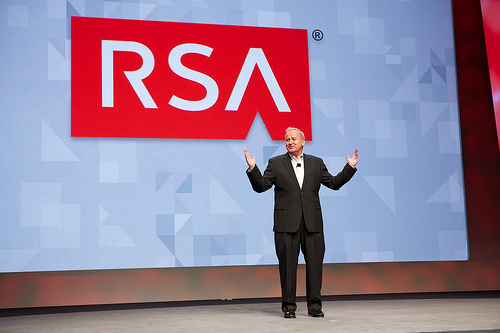 NEWS
NEWS
 NEWS
NEWS
 NEWS
NEWS
![]() The Big Data era has arrived and IT teams will have to welcome it with open arms if they’re to be successful in heading off a new breed of security threats, says RSA’s Executive Vice President Art Coviello.
The Big Data era has arrived and IT teams will have to welcome it with open arms if they’re to be successful in heading off a new breed of security threats, says RSA’s Executive Vice President Art Coviello.
Speaking at his keynote during the 22nd annual RSA Conference yesterday, Coviello spoke of his belief that Big Data is set to transform the way in which enterprises architect and manage their IT security. And this can only be a good thing, insists Coviello, for Big Data will finally help the “good guys” to move one step ahead of the “bad guys”.
According to Coviello, Big Data from the perspective of security is going to morph into what he calls “Big Intelligence”, which will mark the “next phase in the evolution of the information age.”
Coviello has been proclaiming the concept of Big Data intelligence to drive IT security ever since he first introduced it at least year’s RSA event, and today he went one step further, arguing that it’s almost become conventional wisdom. Coviello expanded his ideas even further, explaining that the sheer velocity of data streams being generated today, combined with the rapid advances being made in predictive analytics would soon lead to the development of improved systems that can actually learn from and predict the ever-changing landscape of security threats.
“We need systems that will use big data analytics to evolve by learning from change to give businesses the capability to detect and respond quickly to new and emerging attacks,” Coviello insisted.
“To get a real result, there also needs to be a high degree of integration with GRC (governance, risk and control) systems and automatic defence system. We are not quite there yet, but the process is underway,” he continued, referring to RSA’s new Authentication Manager 8 released this week, and RSA Security Analytics, released last month.
Coviello also spoke about the challenges that lie ahead to get to that stage, saying that the security industry’s ability to analyze rapid streams of data needs further refinement. Ultimately, the goal is to create highly resilient, “anti-fragile” security systems that employ techniques such as machine learning, adaptive capability and internal intelligence, allowing them to become smarter as they respond to attacks.
Warning against the growing dangers posed by an evolving security threat, Coviello insisted that we must “disenthrall ourselves from the reactive and perimeter-based security dogmas of the past and speed adoption of intelligence-driven security.”
Coviello cited RSA’s recently published report on the state of IT security, Big Data Fuels Intelligence-Driven Security, which details the essential components of the kind of Big Data-driven security system that he entails. These include the development of automated tools capable of collecting diverse sets of data and normalizing them, and the need to store Big Data within a centralized warehouse, where security analysts can easily query it. Furthermore, the report presses the need for the development of new analytics engines that can analyze rapidly changing Big Data in real time, and the creation of infrastructures scalable across multiple vectors in order to process large and complex queries.
In addition to these challenges, Coviello notes that the success of Big Data security systems will be dependent on a high level of integration. “No more non-systems of individual, isolated, siloed, static controls,” he urged, saying that Big Data controls need to be agile and predictive. By doing so, enterprises will be able to build a “mosaic of specific information” about infrastructure, users and digital assets that allows security teams to identify abnormal behavior within the flow of data.
THANK YOU